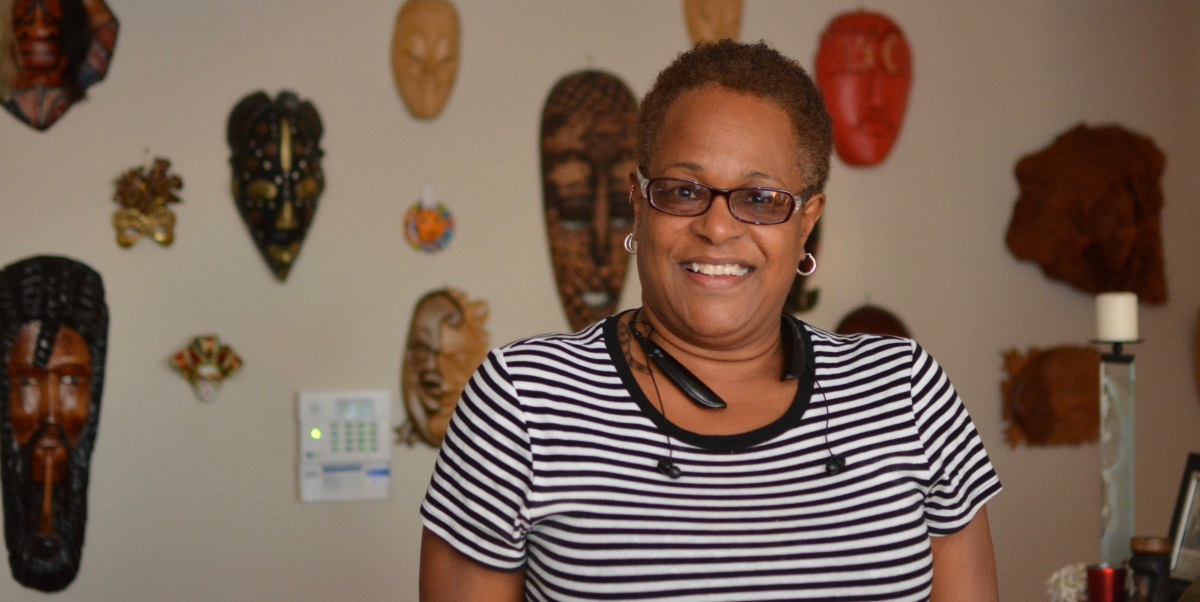Changing Atlanta: Enjoying And Fearing Upscale Development

Alison Guillory / WABE
Atlanta’s intown population is expected to grow by 44 percent over the next 24 years, according to the Atlanta Regional Commission. WABE’s series “Changing Atlanta” examines what that growth means, by talking with the Atlantans whose lives it affects.
Gwen Marshall’s Castleberry Hill apartment has the look of a carefully curated international art gallery.
Indeed, artwork adorns just about every surface, including a striking collection of more than a dozen masks she’s collected from places as diverse as Cozumel, New Orleans and Jamaica.
“I am not a person that has bare walls,” she says.
Marshall moved here two years ago from Stone Mountain after her husband died. She was 57, and wanted to downsize from the house where they lived for 21 years and raised their kids.
“When I made up my mind,” she says, “I got rid of the house. I wanted to be downtown. I grew up very urban, and I’m very familiar with walking, and it just was something I kind of wanted to get back to.”
Marshall grew up in San Francisco. Part of what drew her to Castleberry Hill was the neighborhood’s diversity and quirky artiness. It reminded her a bit of home.
That, and the walkability. Like many baby boomers across the county, she’s made the strategic decision to move from the suburbs back into a more urban, walkable setting.
“Castleberry Hill was a great choice,” she says, “because if I want to have a bite to eat, I can have sushi, No Mas Cantina, or I can keep walking. I couldn’t do that if I lived in Stone Mountain. I mean, if I could walk, I was going to walk to fast food.”
Like a trendy millennial or Gen-Xer, she’s even considering buying a bike to tool around on.
In a couple of decades, Castleberry Hill has traveled that classic arc, from burned-out warehouse district, to fashionable neighborhood peppered with art galleries.
Marshall says the signs of transition are clear:
“Oh, God. You start to see people jog. You start to see people walking their dogs. The look of the grocery stores change! You know, who you see when you go in the store.”
And what’s on the shelves. Marshall is a self-professed “fresh fruit and vegetable lover,” and says her local Kroger resembles a Trader Joes more than ever before — something she’s jazzed about.
All this adds up, she says, to one word: gentrification.
“I mean, I don’t like having to say that. But it is a reality.”
What frightens her is that this reality could force her to leave her beloved Castleberry Hill apartment behind. The complex is set to be renovated.
“They’re going to be upscaled when that’s all said and done,” she says. “And I know that the rents are going to change. So it’s a concern to me because it may be more than I can afford.”
Marshall is a job trainer with Goodwill of North Georgia. Her work is a complete labor of love; it doesn’t pay much. But if that rent goes up, she could be in trouble. While she’s not without options — her grown, suburban-living kids have invited her to come live near them — she’s not interested in leaving city life behind.
“I don’t want to be in the suburbs,” she says, “you know what I mean? That is something I would truly try to avoid if I could.”
As nearby properties in Castleberry Hill and other Westside neighborhoods get snapped up by speculators, the folks Marshall says she really feels for are her neighbors, “your retired teachers and nurses.”
Residents who bought and paid for their houses years ago may now live on fixed incomes that make it difficult or impossible to surf the coming wave of rising property values. What really gets her, is that many of these longtime residents were part of an important Atlanta legacy:
“The civil rights movement. The sit-ins. The protests. You know, you can go to Martin Luther King Jr.’s childhood house [in Atlanta’s Old Fourth Ward], but you can go to his adult house, right over on Sunset!”
She says if the Westside can maintain its diversity in race and class as these neighborhoods change, then that’s great.
But …
“If it gets lost among all of these beautiful, statuesque million-dollar properties, I think a lot of people who are for it now, will wish they hadn’t.”
9(MDAxODM0MDY4MDEyMTY4NDA3MzI3YjkzMw004))








